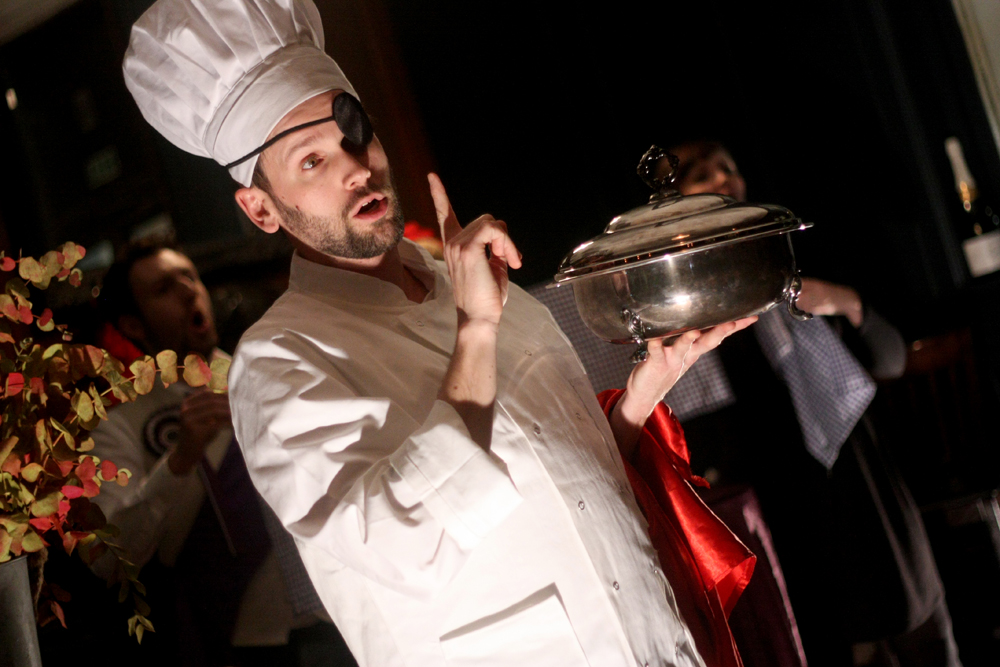An orchestral musician recently told me that only one per cent of graduates from UK music colleges go on to take up a post in an established opera company or orchestra. You’d think, given such an alarming statistic, that there would be a lot of very good voices floating around trying to drum up work. Young talent is enterprisingly putting itself out there in a new wave of pub or site-specific fringe performances. I’ve shied away from pocket Verdi and Puccini stagings because I really wonder if those operas can take any but the most highly-trained, opulent voices; anything less is selling them short to newcomers, though you might just hit gold. But surely a modest staging of a bagatelle like Bizet’s precocious one act opérette Le docteur Miracle can’t go far wrong, can it?
I’m afraid it can. The main problem with Pop-up (or is it Popup? Choices must be made) Opera's latest venture isn’t so much the voices as the slapdash and – to me, at any rate, though others laughed – cringingly unfunny staging. Director Darren Royston lists in his biography past experience as a choreographer and movement director, so he should know better than anyone that in a tiny space, the action has to be taut, decisive, stylized if necessary. Especially if you’re going to give silent-film style captions to the plot which attempt to give a contemporary metatext, and not in a good way, to the French songlines and dialogue.
The 18-year old Bizet’s flippant librettists Léon Battu and Ludovic Halévy adapted their most basic of farces from Sheridan’s St Patrick’s Day. It’s pure commedia dell’arte: the Harlequinesque young lover disguises himself first as a factotum in the household of his beloved’s pompous Mayor-father and then, having cooked a disastrous omelette, resourcefully returns as “le Docteur Miracle” to cure a bad case of poisoned Papa: let me marry your daughter, and I’ll let you off the bill for the remedy.

What’s the site-specific gimmick, given that the setting is a bourgeois household which could be conjured up in just about any space? You’d have thought some parallel culinary activity involving audience tasters would have done the trick. Sadly there isn't any; only alcohol is available, at least at The Running Horse in Mayfair where I saw the show for one night only. Spectators are infantilized into wearing soldiers’ hats and rattling tambourines and triangles in an interpolated Carmen sequence; later they’re asked to “participate” in a game of Hangman. Fun maybe for playschool, not for anyone who has any experience of operatic sophistication or irony.
Helen Bailey takes the limelight with aplomb in the first of three wedding-party encores At least the trios and quartets fizz a little with expert accompaniment from Elizabeth Challenger: the teenage Bizet may not have lavished the melodic gift he shows in the near-contemporary Symphony in C, but it’s an accomplished piece of work. Two of the four singers in the cast I saw did shine at times: Christopher Diffey doesn’t have the high French-tenor ease to take on Nadir’s lovely aria "Je crois entendre encore" from The Pearl Fishers as a preludial croon, but otherwise he’s the real article, if lacking in comic charm, while Helen Bailey, who described herself, uniquely in my experience, as a "Zwischenfach Soprano” but sounds like a perfectly good mezzo, takes the limelight with aplomb in the first of three outrageously grafted-on Carmen wedding-party encores, a stylish Seguidille.
Yet this final arbitrary divertissement only points up how young Bizet’s miracle elixir is simply not enough to sustain even a half-evening’s entertainment. Certainly not when the company is hell-bent on pointing up 'Allo 'Allo absurdities with a wit that’s anything but gracious or focused. And since last night’s establishment was asking £40 a ticket, it’s hard to accept the heavy hand with the good will that might have made it bearable.














Add comment